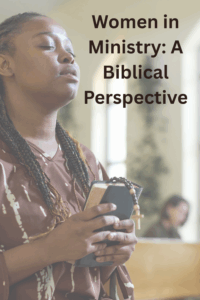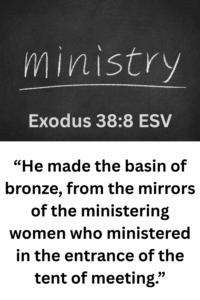Women in Ministry: A Biblical Perspective

What this post is (and is not)
When you hear the phrase “women in ministry,” it can stir a lot of different opinions and emotions. That’s why I want to start by clarifying the heart behind this post. My aim is to look at women in ministry purely from a biblical perspective. This is not a post advocating for women to be pastors, elders, or preachers, nor is it meant to promote women teaching or preaching in ways that Scripture does not affirm. Instead, I want to explore how God has used women throughout His Word to serve Him and His people, and to encourage us to appreciate the roles they played without being divisive.
What Does the Bible Say About Women in Ministry?

Most years, I follow a “read the Bible in a year” plan. But this year, I changed my approach. I’ve been reading just one chapter per day in the ESV version, slowly savoring the words. At this pace, it will take me about three years to read through the whole Bible—but the depth of study is worth it.
One morning, I was especially struck by Exodus 38:8, which says:
“He made the basin of bronze, from the mirrors of the ministering women who ministered in the entrance of the tent of meeting.” (ESV)
At first glance, it’s easy to read past this verse. But when I slowed down, I realized—this is one of the earliest mentions of women serving in connection to the tabernacle. These “ministering women” were not priestesses, nor did they have the same roles as the priests. Still, they were clearly set apart to serve in a sacred space—the entrance to the tent of meeting—where God’s presence dwelled.
Historically, the bronze basin was used by priests for ceremonial washing before serving. The mirrors, made of polished bronze, were likely donated by these women as an act of devotion. While Scripture does not detail exactly what their duties were, we know they ministered in a place where holiness was required. To serve there, they would have been deeply familiar with God’s presence and the reverence it demanded.
Interestingly, the Bible later mentions women in this same position in 1 Samuel 2:22—though in that account, their service was overshadowed by scandal due to the sinful actions of Eli’s sons. This contrast reminds us that serving in God’s presence is both a privilege and a responsibility.
Why Women in Ministry Matter
Throughout Scripture, God chose women for meaningful assignments in His plan. Consider Mary Magdalene—the first person to witness that Jesus had risen from the dead. She was entrusted with the news of the resurrection, becoming the first witness to the greatest event in history. In a sense, she “guarded the tomb” through her presence, and her discernment allowed her to recognize what had happened before others did–making her the first person to share the gospel that Jesus was crucified, buried, and rose from the grave on the third day.
From Old Testament to New, we see that God did not overlook women in His redemptive story. Their service mattered—not because they sought power, but because they were faithful to Him.
Biblical Examples of Women in Ministry

The Bible contains a rich tapestry of stories showing women faithfully serving God in different ways—sometimes in the spotlight, sometimes quietly behind the scenes, but always with eternal impact.
- Miriam – As the sister of Moses and Aaron, Miriam was a prophetess who played a vital role in Israel’s deliverance from Egypt. After the miraculous crossing of the Red Sea, she took a tambourine in her hand, led the women in song and dance, and proclaimed God’s victory (Exodus 15:20–21). Her leadership in worship shows us that ministry isn’t limited to teaching or preaching—it can also involve inspiring God’s people to praise Him.
- Huldah – During the reign of King Josiah, the Book of the Law was rediscovered in the temple. The king’s officials sought out Huldah, a prophetess, to confirm the authenticity of the scroll and interpret its meaning (2 Kings 22:14–20). Her role was pivotal—she delivered a message that spurred national repentance and revival. Huldah’s story reminds us that God sometimes calls women to speak truth at critical turning points.
- Deborah – Known as both a prophetess and a judge, Deborah provided wisdom, guidance, and military strategy to Israel during a time of oppression (Judges 4–5). She worked alongside Barak to lead God’s people to victory, yet her leadership was marked by humility and partnership. Deborah’s example demonstrates that ministry can involve encouraging others to step into the roles God has called them to fulfill.
- Lydia – A seller of purple cloth in Philippi, Lydia is described as a worshiper of God whose heart was opened to Paul’s message (Acts 16:14–15). After her conversion, she extended hospitality to Paul and his companions, making her home a gathering place for believers. Her willingness to use her resources and influence for the kingdom shows the powerful ministry of hospitality and support.
- Priscilla – Alongside her husband Aquila, Priscilla worked in tentmaking and partnered with Paul in ministry. One of their most notable moments came when they took Apollos aside and explained “the way of God more accurately” (Acts 18:26). Priscilla’s quiet yet significant teaching role—always mentioned alongside her husband—illustrates the impact of mentoring and discipleship in a team setting.
- The Daughters of Philip – Philip the evangelist, one of the original seven deacons, had four unmarried daughters who were prophetesses (Acts 21:9). While Scripture doesn’t detail their prophecies, their inclusion in the narrative shows that the early church recognized and valued women who exercised spiritual gifts under God’s guidance.
- Phoebe – In Romans 16:1–2, Paul commends Phoebe as a “deacon” of the church in Cenchreae and a benefactor to many, including himself. She was likely the trusted carrier of Paul’s letter to the Romans—a responsibility requiring integrity and deep commitment to the gospel. Phoebe’s example highlights how women in ministry can serve as trusted leaders and supporters of God’s work.
These women’s stories vary widely—some led nations, some opened their homes, others used their spiritual gifts in ways that supported and strengthened the body of Christ. But together, they remind us that God calls women to meaningful ministry that honors Him, blesses others, and advances His kingdom.
How the Church Can Support Women in Ministry
If God values the service of women, then the church should, too. Scripture makes it clear that women have a vital role in the life of God’s people, and healthy churches will be intentional about nurturing that role. This can be done in several ways, each rooted in biblical principles.
1. Through Discipleship
Mary and Martha give us a beautiful picture of discipleship in action. In Luke 10:38–42, Mary sits at the feet of Jesus, listening intently to His teaching, while Martha serves in the home. In John 11, both sisters show deep faith as they interact with Jesus after the death of their brother, Lazarus. While their approaches were different—Mary in stillness and contemplation, Martha in service and hospitality—both were actively learning from and engaging with their Lord. The church can follow this example by creating spaces where women are encouraged to grow in knowledge of the Word, ask questions, and deepen their relationship with Christ through teaching, small groups, and one-on-one study.
2. Through Mentoring
Titus 2:3–5 outlines a clear pattern for spiritual mentoring among women: older women are to teach and train younger women in godly living—covering everything from character and relationships to managing their homes and walking faithfully with God. This isn’t just a suggestion; it’s a biblical command that benefits the entire church. Mentoring provides accountability, encouragement, and a safe space for younger women to learn from the wisdom and experience of those who have walked with Christ longer. Churches can encourage this by pairing women together for intentional relationships, offering women’s Bible studies that facilitate intergenerational connections, and celebrating the contributions of older women who invest in others.
3. By Encouraging the Use of Spiritual Gifts
In 1 Corinthians 12:1, 4–7, Paul reminds us that every believer—male or female—has been given spiritual gifts by the Holy Spirit for the common good. Gifts such as mercy, encouragement, hospitality, administration, teaching, or serving can be used powerfully when exercised under the guidance of Scripture and within the boundaries of biblical authority. For example, a woman with the gift of teaching may thrive in children’s ministry or women’s Bible studies, while one with the gift of leadership might coordinate outreach programs or organize church events. The key is to help women identify their God-given gifts and give them opportunities to serve in ways that build up the body of Christ while honoring God’s design for church leadership.
When the church disciples women, fosters mentoring relationships, and equips them to use their gifts biblically, it not only honors God’s Word but also strengthens the whole congregation. Just as the early church flourished when men and women served side by side in their God-appointed roles, today’s church will thrive when it values and supports the service of women.
Closing Thoughts
Women in ministry are not a new concept—they have been part of God’s story from the beginning. While their roles may vary and Scripture places certain boundaries on some positions, their service is both valuable and necessary. Just as the ministering women stood at the entrance of the tent of meeting, faithfully serving in the presence of God, women today can continue to honor Him in whatever capacity He calls them to—serving with humility, reverence, and devotion.
Follow us on Pinterest for more faith inspiration and Bible study.
